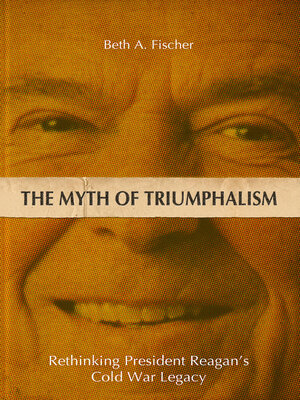The Myth of Triumphalism
ebook ∣ Rethinking President Reagan's Cold War Legacy · Studies in Conflict, Diplomacy, and Peace
By Beth A. Fischer

Sign up to save your library
With an OverDrive account, you can save your favorite libraries for at-a-glance information about availability. Find out more about OverDrive accounts.
Find this title in Libby, the library reading app by OverDrive.



Search for a digital library with this title
Title found at these libraries:
| Library Name | Distance |
|---|---|
| Loading... |
This historical study dismantles the myth of Reagan's hardline victory and sheds light on his true diplomatic success in cooperation with Gorbachev.
Did President Reagan's hawkish policies destroy the Soviet Union and enable the United States to win the Cold War? Many Americans believe this to be the case. In this view?known as "triumphalism"?Reagan's denunciations of the "evil empire" and his military buildup compelled Moscow to admit defeat. The president's triumph demonstrates that America's leaders should stand strong and threaten adversaries into submission.
Drawing on both US and Soviet sources, this study demonstrates that triumphalism is based on a series of falsehoods about President Reagan's intentions, his policies, and the impact his administration had on the Soviet Union. In reality, the president's initially hardline posture undermined US interests and brought the superpowers to the brink of war. Success only came when Reagan changed his approach to one of cooperation.
Together, President Reagan and General Secretary Gorbachev were able to accomplish what no one at the time thought possible?the peaceful conclusion of the Cold War. The president's opposition to nuclear weapons, his determined leadership, and his dedication to diplomacy are his most enduring legacies.
Did President Reagan's hawkish policies destroy the Soviet Union and enable the United States to win the Cold War? Many Americans believe this to be the case. In this view?known as "triumphalism"?Reagan's denunciations of the "evil empire" and his military buildup compelled Moscow to admit defeat. The president's triumph demonstrates that America's leaders should stand strong and threaten adversaries into submission.
Drawing on both US and Soviet sources, this study demonstrates that triumphalism is based on a series of falsehoods about President Reagan's intentions, his policies, and the impact his administration had on the Soviet Union. In reality, the president's initially hardline posture undermined US interests and brought the superpowers to the brink of war. Success only came when Reagan changed his approach to one of cooperation.
Together, President Reagan and General Secretary Gorbachev were able to accomplish what no one at the time thought possible?the peaceful conclusion of the Cold War. The president's opposition to nuclear weapons, his determined leadership, and his dedication to diplomacy are his most enduring legacies.







